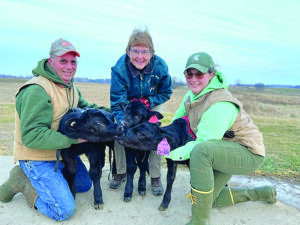By David Fleet
Editor
Atlas Twp. — Holstein #224 has delivered.
In the early morning hours of Nov. 30, Weil Dairy Farm manager Stephanie Weil, opened the barn doors to find Holstein #224, one of about 180 dairy cows on the township family farm, accompanied by three new calves.
“Mom and one calf were standing, the other two were laying down near her,” Weil said. “I thought at first one of the other calves in the barn had wandered over her way. But then I realized she had given birth to triplets.”
The trio were named after the gifts of the Magi, Goldie, Frankie and Myrrh and are healthy and growing.
Dr. J. Richard Pursley is a Professor of the Animal Science Laboratory of Reproductive Physiology, Michigan State University said the fact that Mom delivered triples on her own was quite unusual.
“Many times calving problems are involved with triplets, thus an increase in calf and cow mortality is greater in this situation. Most data would indicate that this is about a 1 in 100,000 occurrence. With all calves being born alive and kicking makes the odds much greater that this scenario would occur.”
The mother and babies have just a 60 percent chance of survival.
“Number #224 had twins a few years ago,” said Weil, a 2013 Goodrich High School graduate, who earned a degree in animal science in 2017 from Michigan State University. “So two was a possibility.”
The siblings, two bull calves and one heifer were the result of artificial insemination with semen from an Simm Angus breed. In addition to about 180 milking cows the farm also raises several hundred beef cattle.
A cow’s gestation period is 40 weeks, just like humans. The calves weighed in at about 60 pounds each. That’s 200 pounds of baby that Holstein #224 carried for 39 weeks — just one week shy of full term.
“She looked normal during her pregnancy,” said Weil. “I was suspicious of twins because the mother started producing more milk about 18 days before the calves were born. But I had no idea she was carrying triplets and our veterinarian did not do an ultrasound.”
Three calves for one cow would be overwhelming for mom, so they are separated and fed from buckets.
Dr. Pursley added to his comments.
“Dairy cows have a much greater chance of multiple births compared to beef cows and even dairy heifers,” he said. “The older the cow gets, the more likely she would have multiple ovulations, and thus multiple eggs that could get fertilized resulting in multiple calves.”
The same thing occurs in humans, he said
“Twinning actually is common in dairy cows with as much as 10 percent of the calving resulting in twins.”
